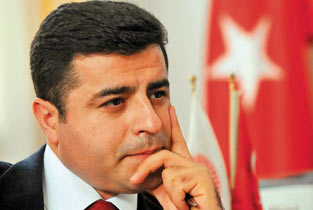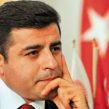
AKP’s Kurdish Initiative Sparks Political Controversy in Turkey
Publication: Eurasia Daily Monitor Volume: 6 Issue: 157
By:

Since Prime Minister Recep Tayyip Erdogan revealed that his government is preparing a plan to address the Kurdish question, the domestic Turkish political debate has focused on whether peace between Kurdistan Workers’ Party (PKK) and Turkey is achievable. The Turkish President Abdullah Gul, during his recent visit to the Kurdish city of Bitlis, referred to its Kurdish name (which was replaced with its Turkish name in 1990’s) -which received furious criticism from the Nationalist Action Party (MHP) (www.cnnturk.com, August 12).
Meanwhile, as the coordinator of the peace initiative, the Interior Minister Besir Atalay met with political parties and non-governmental organizations to brief them on the process and seek their support. As part of that process, Atalay visited the Kurdish nationalist Democratic Society Party (DTP). After the meeting, the Chairman of the DTP, Ahmet Turk stated that, "we are at the beginning of a process. We hope that this journey toward peace will not result in frustration." "We are really hopeful that this process will succeed. However, Turkey’s [political] ground is always slippery. There were similar opportunities in the past, but they all ended in disappointment. I believe that the current opportunity is much more serious," he said (Hurriyet Daily News, August 13). Speaking after his one-hour meeting with the DTP leader Atalay stated: "Let us have confidence. We can solve this, as long as we have self-confidence" (Today’s Zaman, August 14).
The DTP’s Deputy-Chairman Selehattin Demirtas, listed four demands as the basis for any peace settlement including: forming a new constitution that fully supports democracy; amending article 66 of the constitution, which defines a Turkish citizen as anyone "bound to the Turkish state through the bond of citizenship is a Turk," in order to emphasize the non-ethnic qualification for citizenship; removing the ban on using the Kurdish language in education and media and empowering the local municipalities (Vatan, August 14).
In addition to the DTP, Atalay also visited the Turkish workers unions, Turk-Is and Hak-Is and the Union of Turkish Bar Associations (TBB) to seek their support. The President of the TBB, Ozdemir Ozok, who is known for his opposition toward the Justice and Development Party (AKP) government, supported the peace initiative. Turkish workers unions were equally supportive (Zaman, August 14). Moreover, a group of 162 journalists, academics, writers, artists and business representatives declared their backing for the AKP’s efforts to resolve the Kurdish issue. Intellectuals emphasized that they support all efforts to resolve the Kurdish issue through democratic, peaceful and just means. "The Kurdish problem has cost Turkey a lot of suffering, both in financial and emotional terms," noting that parliament had a historic responsibility in ensuring a solution was found, the academics argued (Hurriyet Daily News, August 13)
On the other hand, nationalist opposition groups and political parties furiously opposed the AKP’s initiative. The Nationalist Action Party (MHP) leader, Devlet Bahceli accused the government of dissolving the national unity of Turkey, and he said that Turkish nationalists are ready to fight against the AKP’s plan to negotiate with the terrorist Abdullah Ocalan, the leader of the PKK (Star, August 9).
As part of the process, the government wants to canvas every political party to maximize the level of backing for the controversial plan. Erdogan revealed that the MHP leader Devlet Bahceli refused to meet him in order to discuss the Kurdish issue (Radikal, August 12). Meanwhile, nationalist newspapers have slammed the interior minister for his meeting with the DTP and labeled the meeting as "negotiation with a terrorist organization" (Yeni Cag, August 13).
Opposition Republican Peoples Party (CHP) leader, Deniz Baykal, also opposed the government plan when it was revealed ten days ago (Anka, August 1). However, recently CHP parliamentarians and leaders of its local branches acknowledged that it is a historic opportunity to finally resolve the Kurdish question. For instance, the CHP’s Istanbul branch chairman, Gursel Tekin, said that the steps taken by the government on the Kurdish issue should be fully supported, contradicting his party’s official stance. "One should either support the efforts to resolve the Kurdish issue, or share the responsibility for its failure. Whoever resolves it will be remembered in history: that is the fact," Tekin said (Yeni Safak, August 13).
In response to mounting criticism Erdogan asserted that "we have initiated a democratic reform process. We do not want to see tensions between government institutions, or discrimination in our country" (Sabah, August 14). Political observers believe that the Kurdish initiative is not exclusive to the AKP government, but it is the unanimous plan of the Turkish state institutions (Sabah, August 14).
Perhaps related with the Kurdish initiative, the Diyarbakir police chief revealed that he is hiring police officers who speak Kurdish to improve relations with the local communities (Vatan, August 14). The Turkish Armed Forces (TSK) has chosen to silently monitor the PKK which is considered as a way of offering its indirect support to the peace process.
Despite all these positive developments, the peace process faces the PKK as its main obstacle. The PKK awaits its imprisoned leader, Abdullah Ocalan’s roadmap and it declared that, "the PKK wants its own protection force, the release of the PKK leader and political freedom," and it hopes to form Kurdish PKK units within the Turkish military if a solution is reached (EDM, August 13).




